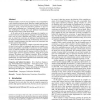Free Online Productivity Tools
i2Speak
i2Symbol
i2OCR
iTex2Img
iWeb2Print
iWeb2Shot
i2Type
iPdf2Split
iPdf2Merge
i2Bopomofo
i2Arabic
i2Style
i2Image
i2PDF
iLatex2Rtf
Sci2ools
117
click to vote
PLDI
2010
ACM
2010
ACM
Bringing Extensibility to Verified Compilers
Verified compilers, such as Leroy's CompCert, are accompanied by a fully checked correctness proof. Both the compiler and proof are often constructed with an interactive proof assistant. This technique provides a strong, end-to-end correctness guarantee on top of a small trusted computing base. Unfortunately, these compilers are also challenging to extend since each additional transformation must be proven correct in full formal detail. At the other end of the spectrum, techniques for compiler correctness based on a domain-specific language for writing optimizations, such as Lerner's Rhodium and Cobalt, make the compiler easy to extend: the correctness of additional transformations can be checked completely automatically. Unfortunately, these systems provide a weaker guarantee since their end-to-end correctness has not been proven fully formally. We present an approach for compiler correctness that provides the best of both worlds by bridging the gap between compiler verific...
Related Content
| Added | 09 Aug 2010 |
| Updated | 09 Aug 2010 |
| Type | Conference |
| Year | 2010 |
| Where | PLDI |
| Authors | Zachary Tatlock, Sorin Lerner |
Comments (0)

